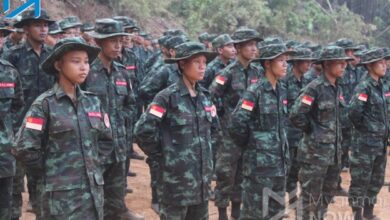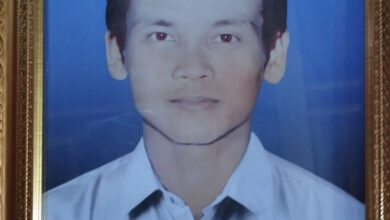
The military officials in charge of defence budgeting and military procurement preferentially buy from the companies they run and own, incentivizing the continuation of Myanmar’s civil wars, a local rights has said.
“This corruption and conflict of interest is by design,” a spokesperson from the local rights group Justice for Myanmar told Myanmar Now last week. “The Myanmar constitution, written by military cartel leadership to protect their power and privilege, robs parliament of the authority to scrutinise the military.”
These conflicts give the military a “financial incentive to continue to flame the civil war,” a statement the group released Wednesday morning said. “It provides them with a justification to maintain power and block democratic reform so they can continue to profit.”
Major general Khin Maung Than serves as director of military procurement while also serving as director of at least 19 public and private companies, according to a UN fact-finding mission.
“As the Myanmar military’s chief procurement officer, he should be expected to act with independence and integrity, when in fact he is positioned to receive major personal benefits from his business dealings,” the group said. “Procurement must be open to tender and transparent to public scrutiny so the people of Myanmar can see how their money is spent.”
Among the companies Khin Maung Than holds executive roles in are the Myanma Five Star Line shipping company, the Kayah State Mineral Production Company, Myawaddy Bank, Lann Pyi Marine and Myanmar Land and Development – all subsidiaries of the military-owned Myanma Economic Holdings (MEHL) conglomeration, which Khin Maung Than is the managing director of.
All of MEHL’s shares are owned by military regiments and battalions, active and retired personnel and veterans’ organisations. Commander-in-chief Min Aung Hlaing is the head of its patron group.
As managing director of MEHL, Khin Maung Than’s role is to maximize profits for its shareholders – himself among them. As director of military procurement, his role is to procure military equipment with public funds.
“Senior general Min Aung Hlaing, major general Khin Maung Than and other military generals are supposed to be public servants, and should be serving with integrity under civilian control. Instead they are personally profiting from their public positions without any democratic oversight,” Justice for Myanmar said.
Quartermaster general Kyaw Swar Lin runs the Myanmar Economic Corporation (MEC), another vast, military-owned conglomerate, and sits on MEHL’s patron group. He also manages the military budget, which has accounted for between 13% and 15% of the overall national budget every year since 2012.
Major general Htun Aung, the air force chief of staff, Major General Moe Myint Tun, head of a special operations bureau in Nay Pyi Taw, and rear Admiral Moe Aung, the navy chief of staff, also sit on MEHL’s board of directors.
Major general Thaw Lwin, in charge of the military’s electronic surveillance programs, also serves as a representative for the telecommunications operator Mytel, itself a joint venture between MEC and Vietnam-based telecom Viettel.
“The merging of the armed forces as a state institution and enterprise for personal profit is unprecedented,” Justice for Myanmar said. “The business of government has merged with the profiteering of the military leadership.”

![Resistance fighters holding heavy weapons ammunition in central Myanmar. (Photo: Freedom Revolution Force [FRF])](https://myanmar-now.org/en/wp-content/uploads/sites/5/2024/04/438869056_443267851680128_1706386881626943924_n-390x220.jpeg)

